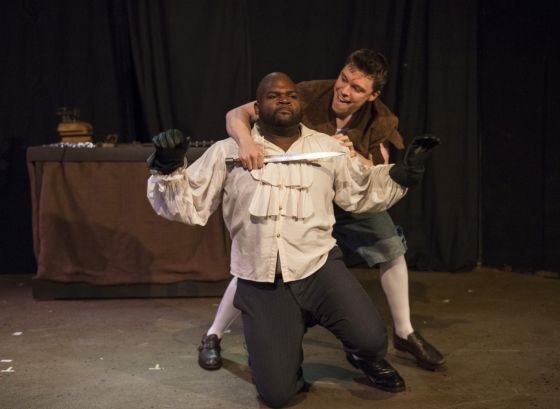
A theater company whose proclaimed goal is the forging of intercultural connections through plays-in-translation might be expected to traffic in modern-language adaptations of, say, Goldoni or Lope de Vega. Commedia Beauregard, however, invites experiments in back-translations of contemporary literature into idioms reflecting their source material as well—for example, Mario Puzo's “The Godfather,” rendered as Jacobean tragedy, rhymed couplets and 17th-century weaponry co-existing with mid-20th-century sartorial fashions.
The foundation for this brand of textual time travel was first established at the Minnesota Fringe Festival in 2009, when a band of players calling itself Tedious Brief Productions performed a one-act presentation transposing the already vertigo-inducing, non-linear action of Quentin Tarantino's seminal faux noir film “Pulp Fiction,” to the blank verse and classical allusions associated with Elizabethan drama. This was later developed into the feature-length script titled Bard Fiction (also known as “Pulp Shakespeare” in some regions for reasons lost to history), under the co-authorship of Ben Tallen, Aaron Greer, and Brian Watson-Jones.
What distinguishes Commedia Beauregard's approach to the often far-fetched premises for its verbal legerdemain is the attention exercised in ensuring the accuracy of their linguistic parallels: changing a character's name from Vincent Vega to Vicenzo de la Vega, or that of a cocktail lounge from Jack Rabbit Slim's to The Tavern of the Slender Hare, or permitting a young prizefighter—boxing was still popular sport in 1614—to hear the tale of his late father's timepiece from that paternal specter, himself.
By the time a heroin dealer has become an apothecary whose tobacco from the New World is sometimes adulterated with potentially fatal additives ("this is such snuff as dreams are made on") requiring a restorative administered by a lance plunged to the heart, we are well outside the realm of late-night dorm-room spoofery.
Christopher Kidder-Mostrom's minimal scenic design is augmented by Joe Griffin's richly detailed soundscape and Jackie Davis's array of all-ages costumes and wigs. Zach Livingston is also to be commended for his imaginative analogical conversions from ballistic violence to old-school steel. (Note the scene where divine intervention comes to the aid of our heroes during an ambush by a spear-wielding assassin.) The only improvement to the experience currently being offered audiences would be a playbill synopsis of Tarantino's screenplay to expedite the comprehension and, it is hoped, the appreciation of playgoers unversed in the vernacular of post-Renaissance London or who—alack the day!—may never have seen the movie.
